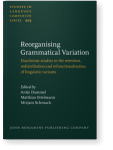Manner of motion and semantic transitivity
A usage-based perspective on change and continuity in the system of the German perfect auxiliaries haben and sein
Based on a corpus of the major Old High German texts and a corpus of contemporary German newspapers, the paper shows that the German auxiliary system is characterised by both continuity and change. While transitivity proves to be a stable predictor of haben selection throughout German language history, auxiliary selection of intransitive verbs has been partly reorganised. At the expense of telicity, the sein perfect became productive within the intransitive group of manner of motion verbs. This reorganisation of the distributional contexts will be explained in terms of entrenchment. Based on several highly frequent motion verbs such as gehen ‘go’, an abstract schema has evolved which systematically connects manner of motion semantics and sein selection. However, semantic transitivity proves to be an antagonist to this recently entrenched manner of motion schema. Highly transitive manner of motion verbs disallow sein selection. The incidence of the haben perfect rises with increasing transitivity. Here, the patienthood of the direct object turns out to be crucial, with individuation being particularly important.
Article outline
- 1.Entrenchment, productivity, and reorganisation
- 2.Cross-linguistic accounts of auxiliary selection: Prototype Approach and Auxiliary Selection Hierarchy
- 3.Auxiliary selection in German language history
- 3.1Corpus study of have and be + V-PP in Old Germanic texts
- 3.2The role of telicity in the auxiliary selection of Early New High German manner of motion verbs
- 4.Corpus study on auxiliary selection in contemporary German
- 4.1Auxiliary selection of intransitive manner of motion verbs: Entrenchment due to high token frequency
- 4.2Productivity of manner of motion semantics and entrenchment of an abstract schema
- 4.3
Haben selection and high transitivity
- 4.3.1
Clear haben selection in highly transitive sentences
- 4.3.2Varying auxiliaries with objects ambiguous between patient and incorporation
- 4.3.3Abstract nouns: Sein selection due to intransitivity
- 4.3.4Path accusatives: Strongest sein preference in the corpus
- 5.Summary: Manner of motion semantics and transitivity in contemporary German
-
Notes
-
Corpora
-
References
